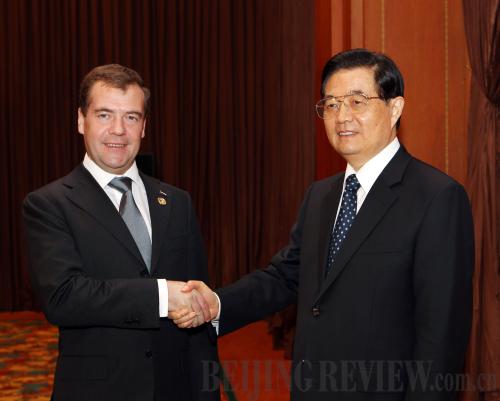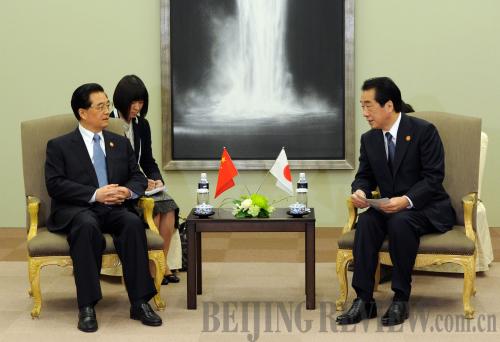 |
|
FIRM PARTNERS: Chinese President Hu Jintao and Russian President Dmitry Medvedev agree to strengthen bilateral cooperation on regional and international organizations during their meeting in Seoul on November 11 (LAN HONGGUANG) |
Hu said China and Russia should each hold grand celebrations to mark the 10th anniversary of the signing of the China-Russia Treaty of Good-Neighborliness and Friendly Cooperation next year. The two countries should also continue to boost their "traditional friendship and all-round strategic cooperation."
"China-Russia mutual political trust keeps strengthening," said Zhao Mingwen, Director of the China Center for Periphery Security Studies with the China Institute of International Studies.
High-level visits between China and Russia have been frequent this year. In May, Hu attended celebrations of the 65th anniversary of Russia's victory over Nazi Germany in Moscow. In September, Medvedev visited China, and the two countries issued a joint declaration regarding World War II.
Participation by Chinese and Russian leaders in significant events in each other's countries serves as proof of strengthening strategic cooperation between the two countries, said Zhao.
In fact, bilateral relations between the two countries are strengthening in many ways. China-Russia trade volume this year is expected to increase by around 45 percent compared to last year, Zhao said. Due to the impact of the financial crisis, bilateral trade volume last year declined to $39.5 billion, according to official Chinese statistics.
The two countries have also made historical progress in energy cooperation. The China-Russia crude oil pipeline started trial operations on November 1. China planned to import 250,000 tons of crude oil from Russia in November and 300,000 tons in December. The pipeline will bring 15 million tons of crude oil across the border annually beginning next January.
China-Russia energy cooperation become more stable with the completion of this pipeline, Zhao said.
During their meeting, the two presidents also agreed to strengthen bilateral cooperation and coordination on international organizations and groupings, such as the G20, the Asia-Pacific Economic Cooperation (APEC), the Shanghai Cooperation Organization and BRIC countries (Brazil, Russia, India and China), in a bid to help advance the reform of the international monetary system and enhance international financial supervision.
"Before participating activities within multilateral frameworks including the G20 and the Shanghai Cooperation Organization, the two countries communicated with each other on major issues in advance, trying to gain the support of each other," said Zhao. "This is another prominent feature of the two countries' strategic cooperation."
China and Japan
Hu held talks with Japanese Prime Minister Naoto Kan on November 13 on the sidelines of the 18th APEC Economic Leaders' Meeting in Yokohama, Japan.
 |
|
SIGN OF REDUCED TENSIONS: Chinese President Hu Jintao tells Japanese Prime Minister Naoto Kan it is in the interests of both nations to improve China-Japan relations during a meeting on November 13 in Yokohama, Japan (LI XUEREN) |
This meeting was regarded as a sign that recent tensions between the two countries regarding the Diaoyu Islands are easing. On September 7, Japanese authorities intercepted and detained a Chinese fishing boat in waters off the Diaoyu Islands in the East China Sea, worsening relations between China and Japan. Both countries claim sovereignty over the islands.
"The meeting sends a positive signal, as Hu and Kan reached a consensus on how to regard China-Japan relations," said Qu Xing, President of the China Institute of International Studies.
"In the 20-minute meeting, President Hu stressed China's stance and proposed the two sides advance China-Japan relations through joint efforts. This proposal was welcomed by Kan," said Gao Hong, an expert on Japanese studies with the Chinese Academy of Social Sciences.
During the meeting, Hu said it is a right choice and in the interests of both peoples for China and Japan to follow a road of peace, friendship and cooperation.
China and Japan, being each other's main trading partner, should continue to deepen their mutually beneficial cooperation, Hu said. He also said the countries should enhance dialogue and coordination on international affairs in a bid to jointly contribute to Asia's revitalization and address global challenges.
Kan said he was in full agreement with Hu's opinions. He said he hoped the two sides will strengthen cooperation in various fields and further improve bilateral relations. | 